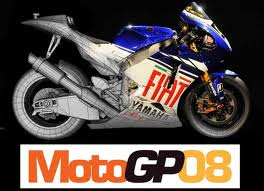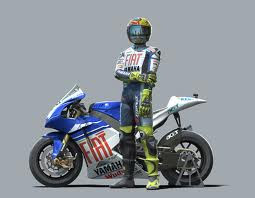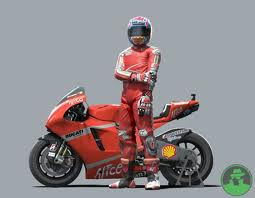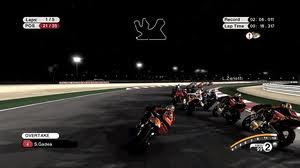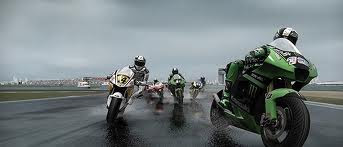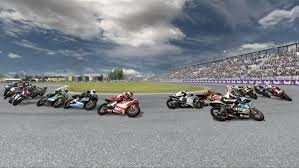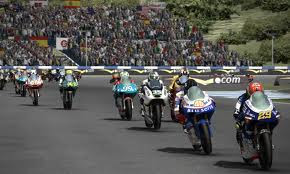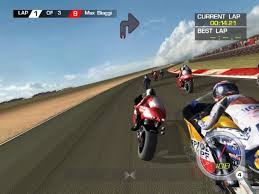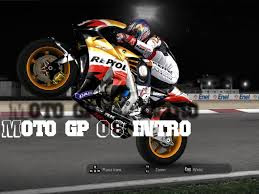Free Download Games Moto GP 2008 Full Version Complate
05.44
Edit

Free Download Games Moto GP 2008 Full Version Complate
Free Download Games Moto GP 2008 Full Version Complate
A racing video game is a genre of
video games, either in the first-person or third-person perspective, in
which the player partakes in a racing competition with any type of land,
air, or sea vehicles. They may be based on anything from real-world
racing leagues to entirely fantastical settings. In general, they can be
distributed along a spectrum anywhere between hardcore simulations, and
simpler arcade racing games. Racing games may also fall under the
category of sports game
In 1973, Atari's Space Race was a space-themed arcade game where
players controlled spaceships that race against opposing ships, while
avoiding comets and meteors. It was a competitive two-player game
controlled using a two-way joystick, and was presented in black and
white graphics. The same year, Taito released a similar space-themed
racing game Astro Race, which used an early four-way joystick. The
following year, Taito released Speed Race, an early driving racing game
designed by Tomohiro Nishikado (of Space Invaders fame). The game's most
important innovation was its introduction of scrolling graphics,
specifically overhead vertical scrolling,with the course width becoming
wider or narrower as the player's car moves up the road, while the
player races against other rival cars, more of which appear as the score
increases. It also featured an early racing wheel controller interface
with an accelerator, gear shift, speedometer and tachometer. It could be
played in either single-player or alternating two-player, where each
player attempts to beat the other's score. The game was re-branded as
Wheels by Midway Games for released in the United States and was
influential on later racing games. That same year, Atari released
another early car driving game in the arcades, Gran Trak 10, which
presented an overhead single-screen view of the track in low resolution
white on black graphics, on which the player races against the clock
around a track to accumulate points; while challenging, it was not
competition racing.
competition racing.
In 1976, Taito released Crashing
Race, a simultaneous two-player competitive car racing game where each
player must try to crash as many computer-controlled cars as possible to
score points, and the player with the most points wins.That same year,
Sega released Moto-Cross, an early black-and-white motorbike racing
game, based on the motocross competition, that was most notable for
introducing an early three-dimensional third-person perspective. Later
that year, Sega re-branded the game as Fonz, as a tie-in for the popular
sitcom, Happy Days. Both versions of the game displayed a constantly
changing forward-scrolling road and the player's bike in a third-person
perspective where objects nearer to the player are larger than those
nearer to the horizon, and the aim was to steer the vehicle across the
road, racing against the clock, while avoiding any on-coming motorcycles
or driving off the road. The game also introduced the use of haptic
feedback, which caused the motorcycle handlebars to vibrate during a
collision with another vehicle. That same year also saw the release of
Sega's Road Race, which also presented a three-dimensional, third-person
roadside scene of the race, displaying a constantly changing
forward-scrolling S-shaped road with two obstacle race cars moving along
the road that the player must avoid crashing while racing against the
clock. That same year, Atari's Night Driver presented a first-person
view, displaying a series of posts by the edge of the road, though there
was no view of the road or the player's car and the graphics were still
low resolution white on black, and like Gran Trek 10, gameplay was a
race against the clock.
In 1977, Micronetics released Night
Racer, a first-person car racing game similar to Night Driver, while
Sega released Twin Course T.T., an early simultaneous competitive
two-player motorbike racing game. Road Champion, released by Taito in
1978, was an overhead-view timed car racing game where players try to
race ahead of the opposing cars and cross the finish line first to
become the winner. In 1979, Sega's Head On was a racing game that played
like a maze chase game and is thus considered a precursor to the 1980
hit Pac-Man. Monaco GP, released by Sega in 1979, improved upon previous
overhead-view racing games with a vertically scrolling view and color
graphics. Another notable video game from the 1970s was The Driver, a
racing-action game released by Kasco (Kansai Seiki Seisakusho Co.) that
used 16 mm film to project full motion video on screen, though its
gameplay had limited interaction, requiring the player to match their
steering wheel, gas pedal and brakes with movements shown on screen,
much like the sequences in later laserdisc video games.
In 1980, Namco's overhead-view driving game Rally-X was the first game to feature background music, and allowed scrolling in multiple directions, both vertical and horizontal, and it was possible to pull the screen quickly in either direction. It also featured an early example of a radar, to show the rally car's location on the map. Alpine Ski, released by Taito in 1981, was an early winter sports game, a vertical-scrolling racing game that involved maneuvering a skier through a downhill ski course, a slalom racing course, and a ski jumping competition.Turbo, released by Sega in 1981, was the first racing game to feature a third-person perspective, rear view format. It was also the first racing game to use sprite scaling with full-color graphics. Bump 'n' Jump, released by Data East in 1982, was a vertical-scrolling driving game where the player's car jumps or bumps enemy cars for points, while bonuses were awarded for completing levels without hitting any cars.
In 1980, Namco's overhead-view driving game Rally-X was the first game to feature background music, and allowed scrolling in multiple directions, both vertical and horizontal, and it was possible to pull the screen quickly in either direction. It also featured an early example of a radar, to show the rally car's location on the map. Alpine Ski, released by Taito in 1981, was an early winter sports game, a vertical-scrolling racing game that involved maneuvering a skier through a downhill ski course, a slalom racing course, and a ski jumping competition.Turbo, released by Sega in 1981, was the first racing game to feature a third-person perspective, rear view format. It was also the first racing game to use sprite scaling with full-color graphics. Bump 'n' Jump, released by Data East in 1982, was a vertical-scrolling driving game where the player's car jumps or bumps enemy cars for points, while bonuses were awarded for completing levels without hitting any cars.
The most influential racing game was
released in 1982: Pole Position, developed by Namco and published by
Atari in North America. It was the first game to be based on a real
racing circuit, and the first to feature a qualifying lap, where the
player needs to complete a time trial before they can compete in Grand
Prix races. While not the first third-person racing game (it was
predated by Sega's Turbo), Pole Position established the conventions of
the genre and its success inspired numerous imitators.
Pole Position II was released in 1983 and featured improvements, such as giving the player the choice of different race courses as well as more colourful landscapes lined with advertising bill-boards.TX-1, developed by Tatsumi in 1983, TX-1 was licensed to Namco, who in turn licensed it to Atari in America,[29] thus the game is considered a successor to Pole Position II. TX-1, however, placed a greater emphasis on realism, with details such as forcing players to brake or downshift the gear during corners to avoid the risk of losing control, and let go of the accelerator when going into a skid in order to regain control of the steering. It was also the first car driving game to use force feedback technology, which caused the steering wheel to vibrate, and the game also featured a unique three-screen arcade display for a more three-dimensional perspective of the track. It also introduced nonlinear gameplay by allowing players to choose which path to drive through after each checkpoint, eventually leading to one of eight possible final destinations
Pole Position II was released in 1983 and featured improvements, such as giving the player the choice of different race courses as well as more colourful landscapes lined with advertising bill-boards.TX-1, developed by Tatsumi in 1983, TX-1 was licensed to Namco, who in turn licensed it to Atari in America,[29] thus the game is considered a successor to Pole Position II. TX-1, however, placed a greater emphasis on realism, with details such as forcing players to brake or downshift the gear during corners to avoid the risk of losing control, and let go of the accelerator when going into a skid in order to regain control of the steering. It was also the first car driving game to use force feedback technology, which caused the steering wheel to vibrate, and the game also featured a unique three-screen arcade display for a more three-dimensional perspective of the track. It also introduced nonlinear gameplay by allowing players to choose which path to drive through after each checkpoint, eventually leading to one of eight possible final destinations
Change Lanes, released by Taito in
1983, was a third-person racer where the player's car had fuel that
reduces while driving, thus the driver must pick-up fuel cells to get a
refuel at each checkpoint, while crashing into cars or obstacles would
slow down the car and further reduce its fuel. If the fuel runs out, the
game would end. That same year, Kaneko produced
Roller Aces, an early roller skating
racer played from a third-person perspective, while Irem released
MotoRace USA, an early partially third-person motorbike racer, where the
player travels across the US and refuels at various cities along the
way, while avoiding crashes that can cause a substantial loss of fuel,
causing the game to end if the fuel is depleted.An early attempt at
creating a home driving simulator was Tomy's Turnin' Turbo Dashboard,
also released in 1983. It was the first home video game to feature a
racing wheel controller.
Processor: Pentium 4 Processor
Memory: 512 MB (1 GB on Vista)
Hard Drive: 8 GB Free
Video Memory: nVidia GeForce 6600/ATI Radeon X1600 (Shader Model 3.0)
Sound Card: DirectX Compatible
DirectX: 9.0c
In 1984, several early racing laserdisc video games were released,
including Sega's GP World and Taito's Laser Grand Prix which featured
live-action footage, Universal's Top Gear featuring 3D animated race car
driving, and Taito's Cosmos Circuit, featuring animated futuristic
racing. Taito also released Kick Start, a fully third-person motorbike
racing game, and Buggy Challenge, an early dirt track racing game
featuring a buggy. Other early dirt racing games from that year were
dirt bike games: Nintendo's Excitebike and SNK's motocross game Jumping
Cross, both played from a side-scrolling view. SNK also released
Gladiator 1984, an early horse racing game, and Mad Crasher, an early
futuristic racing game, where the player drives a futuristic motorbike
along diagonal-scrolling futuristic roads suspended in mid-air, while
leaping across gaps, shooting other cars, and getting bonuses and
power-ups. Another racing game that involved shooting that year was
Nichibutsu's Seicross, where the player rides a motorcycle-like craft,
bumps other riders, collects power modules and shoots blue coins. Other
notable arcade releases that year include Konami's Road Fighter, a
vertical-scrolling racer where the aim is to drive fast, pass cars and
avoid accidents for maximum points, while reaching check points before
running out of fuel; and Irem's The Battle-Road, an early open-ended
vehicle combat racing game that featured branching paths and up to 32
possible routes. Another unique take on the genre that year was Plazma
Line, a first-person space racing game that is considered the first
computer game with 3D polygon graphics. The objective of the game is to
race through outer space in a first-person view while avoiding obstacles
(rendered in 3D polygons) along the way. It also featured an automap
radar to keep track of the player's position.
Racing games in general tend to drift toward the arcade side of
reality, mainly due to hardware limitations, especially in the 1980s and
1990s. It is, however, untrue to say that there were no games
considered simulations in their time. In 1984, Geoff Crammond, who later
developed the Grandprix series (Known collectively as GPX to its
fanbase), produced what is considered the first attempt at a racing
simulator on a home system, REVS, released for the BBC Microcomputer.
The game offered an unofficial (and hence with no official team or
driver names associated with the series) recreation of British Formula
3. The hardware capabilities limited the depth of the simulation and
restricted it (initially) to one track, but it offered a semi-realistic
driving experience with more detail than most other racing games at the
time.
In 1985, Sega released Hang-On, a
popular Grand Prix style rear-view motorbike racer, considered the first
full-body-experience video game, and was regarded as the first
motorbike simulator for its realism at the time, in both the handling of
the player's motorbike and the artificial intelligence of the
computer-controlled motorcyclists. It used force feedback technology and
was also one of the first arcade games to use 16-bit graphics and
Sega's "Super Scaler" technology that allowed pseudo-3D sprite-scaling
at high frame rates.That same year, Jaleco released City Connection, a
platform-racer where cops chase the player around different cities in
the US, UK, France, Japan and India.
In 1986, Durell released Turbo Esprit, which had an official Lotus
license, and featured working car indicator lights. Also in 1986, Sega
produced Out Run, one of the most graphically impressive games of its
time. It used two Motorola 68000 CPUs for its 2D sprite-based driving
engine, and it became an instant classic that spawned many sequels. It
was notable for giving the player the non-linear choice of which route
to take through the game and the choice of soundtrack to listen to while
driving, represented as radio stations. The game also featured up to
five multiple endings depending on the route taken, and each one was an
ending sequence rather than a simple "Congratulations" as was common in
game endings at the time. That same year, Konami's WEC Le Mans was a
race driving simulator that attempted to accurately simulate the 24
Hours of Le Mans competition, with fairly realistic handling, a
day-night cycle, and the use of force feedback to simulate road
vibration in the form of a vibrating steering wheel that reacts to the
driver's acceleration and off-road bumps. In 1987, Namco produced Final
Lap, the unofficial sequel to Pole Position II. Final Lap was the first
arcade game that allowed multiple machines to be linked, allowing for
multiplayer races, with up to eight players in total.It was also
arguably the first racing game to implement "rubber banding" to ensure
that less talented players were never too far behind the leader, a
concept that would be taken much further by the Mario Kart series. Also
in 1987, Square released Rad Racer, one of the first stereoscopic 3D
games. In the same year, Atari produced RoadBlasters, a driving game
that also involved a bit of shooting.
In 1988, Taito released Chase H.Q., a unique racing game where the
player drives a police car that must chase criminals within a time
limit. CBS Sony released Paris-Dakar Rally Special, an imaginative
racing game with platformer and action-adventure elements, featuring
Dakar Rally cars that could fire bullets, the driver able to exit the
car and go exploring to lower a bridge or bypass other obstacles,
underwater driving sections, and at times having avoid a fleet of tanks
and fighter jets. That same year, Namco released an early 3D racing game
in the arcades, Winning Run.
In 1989, Atari released Hard Drivin', another arcade driving game that
used 3D polygonal graphics. It also featured force feedback, where the
wheel fights the player during aggressive turns, and a crash replay
camera view. That same year, the now defunct Papyrus Design Group
produced their first attempt at a racing simulator, the critically
acclaimed Indianapolis 500: The Simulation, designed by David Kaemmer
and Omar Khudari. The game is generally regarded as the first true auto
racing simulation on a personal computer. Accurately replicating the
1989 Indianapolis 500 grid, it offered advanced 3D graphics for its
time, setup options, car failures and handling. Unlike most other racing
games at the time, Indianapolis 500 attempted to simulate realistic
physics and telemetry, such as its portrayal of the relationship between
the four contact patches and the pavement, as well as the loss of grip
when making a high-speed turn, forcing the player to adopt a proper
racing line and believable throttle-to-brake interaction. It also
featured a garage facility to allow players to enact modifications to
their vehicle, including adjustments to the tires, shocks and wings. The
damage modelling, while not accurate by today's standards, was capable
of producing some spectacular and entertaining pile-ups
MotoGP motorcycle racing is a
sporting event of the most prominent in the world today. High speed and
highly precise accuracy curves to determine whether drivers will be
revered as a winner or loser falls into the group. When the
professionals are the meandering length of the circuit, this work looks
incredible easy and fun. But what about when you are asked to do it
yourself?
It is impossible for me to try driving a motor-powered motor is
then able to comment on. But all things there must be a way, and the
simplest for me? Try directly in the MotoGP gaming series, 2010/2011!
The first warning is that I should declare myself as a gamer is not
really like racing genre. But if asked whether I find extraordinary
challenge in it? The answer is yes. Racing games are always present as a
stepping stone that should be skipped.
I'm not going to categorize the MotoGP as an ordinary racing game
that has the certainty of releases each year. This game is more suitable
referred to as a MotoGP motorcycle racing game simulation for a variety
of detail is included as an element affecting the race. We're not
talking about sheer speed, but accuracy curves, setting the motor, until
the track conditions affect it all. Even in the setting of "assisted"
anything, you will still feel the level of difficulty.
Screenshots below will give some idea how the 2010/2011 MotoGP
machine seen in the XBOX 360 and I was quite surprised by it. I was
quite surprised with the quality of the graphics look bad (I have not
seen the face of riders are offered at all). Posture of the riders look
similar to each other without any characteristic. Is this going to
affect the game overall? Hopefully not.
Sensation MotoGP
If you are a fan of one of the grandest events in the world of
motorcycle racing, MotoGP, then you come to the right place. Of course
there is no free movie tickets or a chance to try out a motor-powered
motor is incredible on the track of international renown. You turned out
to have the opportunity to experience it all through a simple step.
Prepare your console, preparing for the funds that are not too large, go
to the game store, and buy a game called MotoGP 2010/2011!
Adrenaline may be perceived by the drivers on the track at high
speeds can you record through the game Moto GP 2010/2011. Although this
game continue to be released per year with updates to date, but can not
be denied his presence always brings a different experience. MotoGP
2010/2011 not only offers a racing game for you, it offers more.
You will surely agree with the opinion stating that the 2010/2011
MotoGP motorcycle racing is not an ordinary game. Various complexity
makes this game more suitable to be called as a racing simulation game
than a simple racing game such as Need for Speed. If it can be
described, MotoGP is a Gran Turismo for two-wheeled vehicles. Speeds as
well as take into account the timing and accuracy of the overall aspect
of this game has to offer. Do not look at one eye, MotoGP 2010/2011
really challenging.
Complexity and Challenges
Complexity and Challenges
If you belong to gamers who like to play a racing game with simple
buttons, it is advisable not to try this game. You may often find racing
games that are "automatically" do the technical setting that makes you
easy to make a sharp turn. Or you belong to those who enjoyed racing
games that make you can race vehicles as fast as you want without much
hindrance? If your answer is yes, then this 2010/2011 GP you should
avoid. Why?
If the typical game Need for Speed
and the like, turn you will be assisted automatically by a computer,
you can create the perfect cornering quite as bad as anything you are
trying to slow the vehicle. In MotoGP? Even in the most simple setting,
you will find the barriers to doing so. MotoGP 2010/2011 already
provides guidelines in the form of green and red lines to let you know
the exact timing for cornering and put a halt quickly and precisely. You
definitely will record a perfect time if successfully followed. The
problem? Not that easy to move in accordance with existing guidelines.
If you still want to get more challenge, do not hesitate also to change
the mode to a more difficult setting.
Motorcycle customization also be sold by the Moto GP series so far.
You as gamers have the freedom to do penyeusaian-adjustment on the motor
with enough detail as an element of personalization to the performance
of the motor. By fiddling with this, you will feel the effects are
stunning feels quite significant. If you simply understand the ins and
outs of the automotive, this feature will definitely attract your heart.
Minimum System Requirements :
OS: Windows XP/VistaProcessor: Pentium 4 Processor
Memory: 512 MB (1 GB on Vista)
Hard Drive: 8 GB Free
Video Memory: nVidia GeForce 6600/ATI Radeon X1600 (Shader Model 3.0)
Sound Card: DirectX Compatible
DirectX: 9.0c
Free Download Games Moto GP 2008 Full Version Complate
DOWNLOAD:
http://adf.ly/U4rt4
Or

Free Download Games Moto GP 2008 Full Version Complate
